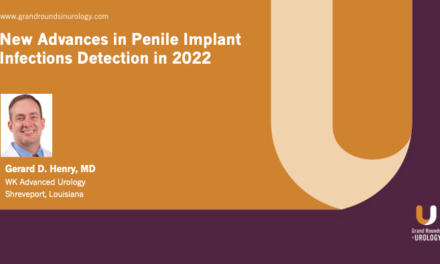Seth K. Bechis, MD, presented “Point-Counterpoint: Next Generation Sequencing vs. Standard Culture – Next Generation Sequencing” during the 30th Annual Perspectives in Urology: Point-Counterpoint, on March 10, 2023, at Humphreys Half Moon Inn, San Diego, California.
How to cite: Bechis, Seth K. “Point-Counterpoint: Next Generation Sequencing vs. Standard Culture – Next Generation Sequencing.” March 10, 2023. Accessed Jun 2025. https://grandroundsinurology.com/point-counterpoint-next-generation-sequencing-vs-standard-culture-next-generation-sequencing/
Point-Counterpoint: Next Generation Sequencing vs. Standard Culture – Next Generation Sequencing – Summary
Seth K. Bechis, MD, expresses concerns with standard urine cultures and discusses the efficacy and efficiency of next generation sequencing. Dr. Bechis first examines standard urine cultures, noting their 30%-50% diagnostic error rate. He outlines other shortcomings of standard urine cultures, including their expensive and relatively slow process, inaccurate contamination results, unclear threshold for positive tests, and additional error rates.
Dr. Bechis cites two studies in which researchers discovered inaccuracies in urine culture results for clinically suspected UTI patients and women with dysuria. He then discusses polymerase chain reaction-based (PCR-based) assays and next generation sequencing (NGS). He highlights an advantage of this combination, explaining that it can detect every organism in a sample. Dr. Bechis evaluates PCR-based assays and NGS further and explains their ability to identify both bacteria and fungi.
He supports NGS technology by introducing three examples that compare standard urine cultures to NGS. These examples address UTI patients, cystitis patients, and renal stone patients.
Dr. Bechis highlights the increased detection capabilities of NGS compared to standard urine cultures, noting that NGS can even lead to better treatment and more appropriate antibiotic use. He also explores a pilot study that compared urine cultures to NGS and found that 80%–90% of physicians would have changed their preoperative antibiotics approach based on NGS results. Dr. Bechis completes his discussion by reviewing NGS benefits, advocating for NGS implementation in practice.
This lecture is part of a Point-Counterpoint debate. Its opposing lecture is “Point-Counterpoint: Next Generation Sequencing vs. Standard Culture–Standard Culture.”
About the 30th Annual Perspectives in Urology: Point Counterpoint conference: Presented by Program Chair and Grand Rounds in Urology Editor-in-Chief E. David Crawford, MD, this conference brought together leading experts in urology, medical oncology, and radiation oncology to discuss and debate the latest topics in genitourinary cancers, primarily prostate cancer and bladder cancer. This interactive conference offered topical lectures, pro/con debates, interesting-case presentations, interactive panel discussions, and interactive audience and faculty networking.
ABOUT THE AUTHOR
Seth K. Bechis, MD is a board-certified urologist specializing in diseases of the urinary tract, including kidney stones, benign prostatic hyperplasia (BPH) or enlarged prostate, and men's health issues. Dr. Bechis completed fellowship training in laparoscopy/robotics and endourology at the University of California (UC), San Diego School of Medicine, and residency training at Harvard Medical School, Massachusetts General Hospital in Boston. He earned his medical degree from UC San Francisco School of Medicine and holds additional Master of Science training in biomedical research, also from UC San Francisco, focusing on ways to prevent and treat diseases.
As a member of the Comprehensive Kidney Stone Center at UC San Diego Health, Dr. Bechis has a special interest in advanced surgical treatment, medical prevention, and research on kidney stone disease. He has surgical expertise in percutaneous nephrolithotomy (PCNL) for complex stones, ureteroscopy, and shockwave lithotripsy. Dr. Bechis specializes in all procedures of the prostate including minimally invasive procedures such as Rezum water vapor therapy and UroLift, as well as robotic surgery and GreenLight™ Laser photoselective vaporization of the prostate (PVP).
Dr. Bechis serves as the associate program director for the UC San Diego - Kaiser Laparoscopy/Endourology Fellowship in the Department of Urology at UC San Diego School of Medicine. His current research includes improving surgical techniques and clinical outcomes in stone disease, as well as tools for stone diagnosis and opiate-sparing pathways for managing pain. His research has been featured in peer-reviewed medical journals and he has authored chapters for university handbooks.
Prior to joining UC San Diego Health, Dr. Bechis worked at Massachusetts General Hospital and Harvard Medical School, where he taught residents and medical students in the operating room and clinic.




